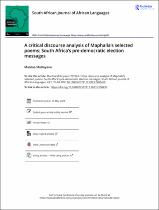| dc.contributor.author | Motinyane, Mantoa | |
| dc.date.accessioned | 2024-02-14T09:58:16Z | |
| dc.date.available | 2024-02-14T09:58:16Z | |
| dc.date.issued | 2023 | |
| dc.identifier.citation | Mothupi, M., Dasgupta, J., Jebeli, S.S.H., Stevenson, J., Berdichevsky, K., Vong, S., Barasa, E. and George, A., 2023. Using an intersectionality approach to transform health services for overlooked healthcare users and workers after covid-19. bmj, 381. | en_US |
| dc.identifier.uri | http://dx.doi.org/10.1080/02572117.2023.2200450 | |
| dc.identifier.uri | http://hdl.handle.net/10566/9303 | |
| dc.description.abstract | The years 1990 to 1994 were the most critical years in the lives of all South Africans. For writers, this period presented an opportunity for expressions that have long been suppressed due to the censoring of writers in South Africa. Poetry was one of the ways in which a writer was able to reveal and express his or her thoughts about what they see, hear and the general events that are related to their lives and society at large. Maphalla is also one of the writers who used the pen to spread the messages of death, pain, love, hope and peace, whilst also being very critical of the socio-political environment at the time. As his name (the peaceful one) implies, Kgotso Maphalla was a writer Mwho was able to rebuke, criticise and give hope in a peaceful manner. This article analyses four of Maphalla’s poems from his poetry book called Seitebatso [Oblivion]. The four poems were selected to address the themes of freedom, hope and injustice. | en_US |
| dc.language.iso | en | en_US |
| dc.publisher | Routledge | en_US |
| dc.subject | South Africa | en_US |
| dc.subject | Kgotso Maphalla | en_US |
| dc.subject | Censorship | en_US |
| dc.subject | Poetry | en_US |
| dc.subject | School curricula | en_US |
| dc.title | A critical discourse analysis of maphalla’s selected poems: South Africa’s pre-democratic election messages | en_US |
| dc.type | Article | en_US |

